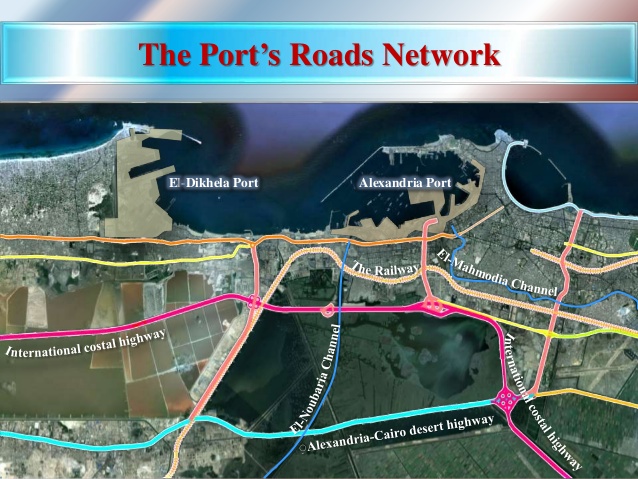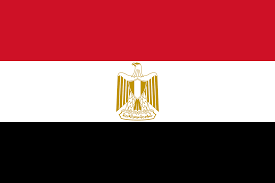Why invest in Alexandria?
Location, Free Zone, Resources

Why invest in Alexandria?
- Alexandria is the first Egyptian trading city. It is the hub, where imports and exports are transported through Egypt's # 1 seaport corresponding to over 40% of the trading traffic of goods as well as vessels.
- Industries existing in Alexandria represent nearly 40% of the national industries.
- Alexandria has an outstanding rank in terms of the production of vegetables and fruits.
- Alexandria is ranked among the top cities nationwide in terms of the production of fish, poultry, red meat and eggs.
- Availability of infrastructure across all areas, e.g. roads transportation, communications, electricity, water and sewage networks.
- Availability of a large number of operational companies and plants offered for sale (privatization).
- Availability of human resources and experienced calibers of young graduates of all specialties.
- Access to the International Northern Coastal Road.
- King Marriout area, which is characterized by its healthy dry climate that is suitable for starting businesses such as spas and specialized hospitals.
- Tourist villages and their investment throughout the year.
- Access to two international airports in Alexandria (Al-Nozha and Borg Al-Arab) to provide services to the city, which increases investment opportunities and facilitates the traffic of imports and exports.
- Availability of agricultural projects on lands allocated to young graduates.
- The private sector, which, based on experience, has proven that it is the driver that is most capable of achieving economic growth rates and leadership in investment.
Alexandria Public Free Zone
Alexandria is the largest Egyptian sea port located on the Mediterranean. The Free Zone is located in Amreya on the Cairo/ Alexandria Road. It spreads across an area of 5,700,000 m2, and is 20 kms away from Alexandria Port and Al-Nozha International Airport. The Free Zone provides a wide range of services including shipping, unloading, navigation and transport. It is close to Alexandria, Al-Dekheila, and Al-Nozha and Borg Al-Arab International Airports. Alexandria is the largest free zone in Egypt, where the following businesses are established:
- Chemicals.
- Oil Refinement.
- Petrochemicals.
- Spinning and weaving.
- Ready-made apparel.
- Cooking oils and vegetable oil derivatives.
- Iron and steel production.
Raw Materials
White Sand
Region: Western Desert (Lower Wadi Al-Natroun).
Location: at 115km on Cairo/ Alexandria desert road.
Reserve of Raw Material: 1.7 million metric tons.
Industries:
- Glass products (lenses, glass panes and frosted glass).
- Faience, ceramics, bathroom tools, and kitchen utensils.
- Water filters and liquid filtration equipment.
- Pulverization (hydraulic crushing).
- Metal casting molds.
- White cement.
- Abrasives (white sand is used for the manufacture of sandpaper, and rock cutting and forming by use of a metal wire).
- Production of sodium silicate used in the manufacture of soap and zeolites.
- Production of silica firebricks.
- Manufacture of silicon carbide
Sodium Chloride
It is produced from sea water, where the quantity extracted from its solution is about 60% of its original weight of salt dissolved in water. It is extracted in two ways: solar evaporation of seawater, or vacuum evaporation through industrial methods using solar energy.
Region: Alexandria.
Location: Al-Max.
Uses: Sodium chloride is used in the production of caustic soda and chlorine, which is used in the salt industry.
Ports
- Port of Alexandria:–
- Port of Al-Dekheila:–
It is the main port in Egypt, through which over 55% of Egypt's foreign trade is trafficked.About the Port of Alexandria, click here
It is a natural extension of the Port of Alexandria. Construction works were started in 1980. Interim operation was started in 1986, the metals marina was operational (Quay 90). The port is established at the former site of the airport of Al-Dekheila air base, at a distance of about 7 km by sea and about 10 km by road to the west of Alexandria Port.
Investment Drivers
- Industrial Investment:
- Tourism Investment:
- Agricultural Investment:
Alexandria is regarded as an industrial city for the most part; its industrial production represents about 40% of Egypt's total industrial production. Industrial activities are centered in areas including Muharram Bey, Kabbari, Al Seyouf, Al Ras Al Souda, Abu Sulaiman, Hagar-Al Nowateya, Al Tabiya, Abu Qir, Borg Al Arab and the western area of Alexandria.The most fundamental industrial investments include chemicals, metallurgy, leather, electricals, engineering, textiles, cement and oil industries.
Alexandria is renowned as a distinctive tourist appealing destination given its outstanding location, moderate climate, and architectural style and elegance. Alexandria features ancient archaeological genuineness, contemporary architectural aesthetics, beauty of nature, unique peculiar beaches. It brings together the majestic fragrance of the past with the hippy pleasures of the city. Tourists are offered an opportunity to experience this exquisite blend, where there is about 41 tourist attractions to meet the needs of tourist of diverse interests. The tourism sector includes a variety of Quick Links including leisure, religious, medical, sports, yachts, festivals, exhibitions, and conferences tourism areas.The most popular religious tourist attractions include Abul Abbas Mosque, Al Busayri Mosque, Mar Mina Monastery, Church of St. Mark, Pompey's Pillar, and Kum Al Shukafa Cemetery. Popular archaeological sites include the Roman Amphitheater and Qait Bey Citadel. Recently, the revived Library of Alexandria, or Bibliotheca Alexandrina, has become a phenomenal cultural landmark in Alexandria.
The total area of farmed land in Alexandria is about 162.1k acres, in addition to 133k acres of arable land. Agriculture primarily depends on flood irrigation from Al Mahmoudeya Canal and new water projects at Al Nubaria. There is a vast area of farmed lands at the North West Coast, whose irrigation is dependent on rainwater. The total crop area in the city is 318k acres with an agricultural intensification coefficient of 1.96.
Potentials of Service Investment:
Investment Potentials and Incentives
- Alexandria is recognized as a beacon of knowledge and culture. It has always been treasured in history for being the birthland of intellect, for its diverse universities in the past, and nowadays for the modern academic and learning institutions such as the Arab Academy for Science, Technology, and Maritime Transport, and Bibliotheca Alexandrina- the world's cultural edifice.
- Access to a number of major interstate road networks.
Investment Opportunities
- Availability of a number of sites that are suitable for businesses such as wellness centers.
- The possibility of establishing specialized universities.
- The possibility of establishing a shopping malls.

